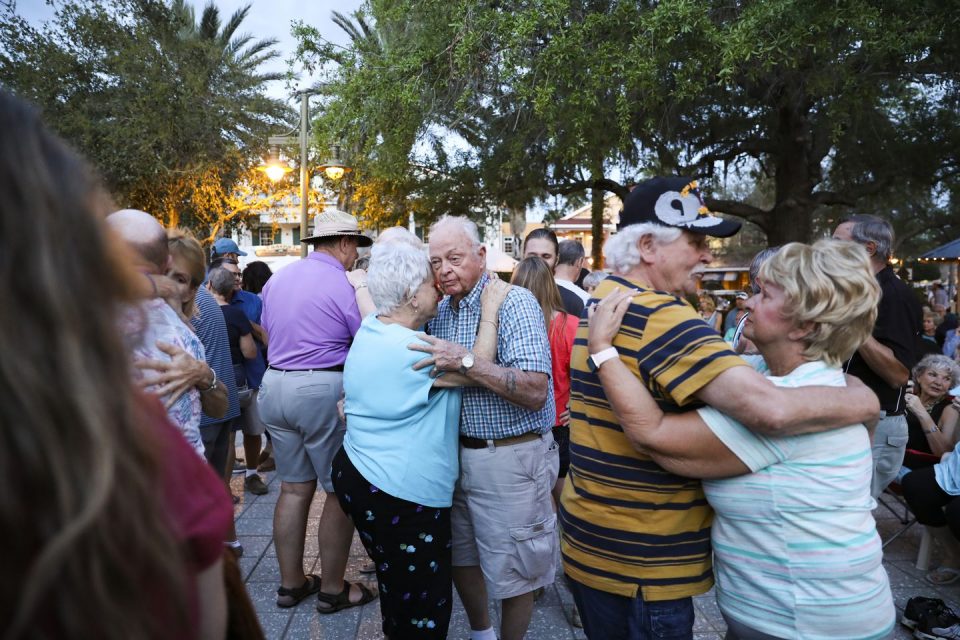Gentile is one of the Americans most at risk from the virus. The Centers for Disease Control and Prevention has warned those 60 and older and those with medical conditions to be particularly wary of its spread, given the higher mortality rates associated with those factors. Gentile would seem to fit into both categories, but, like many other residents of the Florida retirement community The Villages who were profiled by The Post this week, he doesn’t seem particularly worried.
The Villages has become something of a benchmark for older America, surging in size as the number of older Americans has steadily increased. A visit to the community earlier this week found that residents were continuing their social activities as they normally would, most as unrattled as Gentile. For some readers it spurred nothing short of bafflement: young people are forgoing social activities to halt the spread of a disease that isn’t particularly dangerous for them but those most at risk are living life as normal?
Part of the issue may be that The Villages isn’t necessarily as representative of America’s older population as it may seem.
Earlier this week, Quinnipiac University released polling showing that older Americans are, in fact, more likely to express concern about they or someone they know being infected with the virus. Sixty-two percent of those age 65 and older expressed at least come concern about that happening compared to only 47 percent of those under age 35. Older respondents were also about nine points more likely to express concern about their daily lives being disrupted.
Why might The Villages be an outlier? Because it’s more heavily Republican.
Republicans outnumber Democrats by a 2-to-1 margin in that community, a much more conservative composition than older Americans in general. According to Pew Research Center, baby boomers are about evenly split between the parties. Those born during World War II or before lean Republican by about nine points — not a 2-to-1 split.
Digging into the Quinnipiac data a little further, we see that this makes a difference. Republicans are broadly less likely to express concern about being infected with coronavirus. But while older Democrats are far more concerned about it than younger Democrats, older Republicans are about as blasé about the prospect as are younger Republicans.
Younger Democrats are in fact more worried about the virus than older Republicans.
The same pattern holds for concern about disruptions. Older Republicans are much less concerned about their lives being disrupted than older Americans from other political groups. (Younger Republicans are the least likely to be concerned about such disruptions.)
Part of that is likely because older Republicans join younger Republicans in having broad confidence in both the government’s ability to deal with the coronavirus (about 4-in-5 member of each group express such confidence) and in approving of how President Trump has handled the situation. (The Quinnipiac poll was conducted from March 5 to March 8.)
It’s worth noting a significant part of Sal Gentile’s expressed lack of concern about the virus: his pointed mention about what “TV stations” were advocating.
Pew data indicate that about 3-in-10 members of both political parties identify cable news as their most common platform for political news. But the preferred cable news station varies widely depending on a viewer’s politics. Almost no Democrats of retirement age identify Fox News as their main source of political or election news. Fully half of Republicans did.
Fox News, of course, is home to a number of hosts who’ve dismissed the threat posed by the coronavirus, framing the sense of urgency conveyed on other networks as being about Trump’s presidency rather than the public health. If that is the message that half of older Republicans are hearing, it’s not really a surprise that they are less concerned about the virus.
Hopefully, the events of the last few days are shifting any lackadaisical attitudes of older Americans. After all, health experts aren’t advising retirees to curtail their social activity to save the lives of younger people. They’re offering that advice so that older Americans don’t put their own lives at risk.


